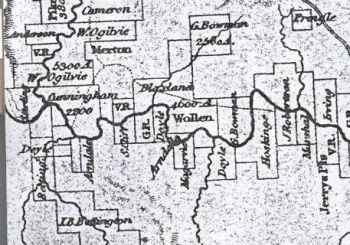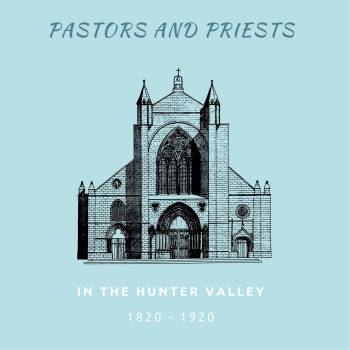Rev John McGarvie - Settler
Map 6
John McGarvie was born in Scotland in 1795. He was selected by Rev. John Dunmore Lang as minister for the Ebenezer church at Portland Head on the Hawkesbury River and arrived in the Greenock in 1826.
Land Grant
John McGarvie received a grant of 640 acres on the 18th July 1828. This land was re-advertised in favour of Cyrus Matthew Doyle in 1838.
Death
Rev. McGarvie died in 1853 and was buried at the Gore Hill cemetery.His obituary was published in the Sydney Morning Herald in April 1853.....
THE funeral of the late Rev. Dr. McGarvie took place yesterday, and was most numerously attended. St. Andrew's Scots Church, to which the body was removed, was filled by a congregation composed of representatives, both lay and clerical, of all the religious bodies in the colony. The service, which was performed by the Rev. Mr. Coutts, consisted of singing a paraphrase of a portion of the 15th chapter of the 1st Epistle to the Corinthians, an extempore prayer, reading the account of the raising of Lazarus, from St. John's Gospel, and an address principally founded on that interesting and affecting narrative.
The body was then taken to the burial ground, followed by a large number of carriages. When it was deposited in the grave, the ceremony was concluded by a prayer from the Rev. Mr. Stewart.
Dr. (then Rev. Mr.) McGarvie arrived in the colony 27 years since, and was for a short time stationed at Portland Head, where at that time a number of Presbyterians resided ; but the increase of the population of Sydney rendered it desirable that a second Presbyterian congregation should be established. Mr. McGarvie was invited to take charge of it, which he did; and shortly afterwards, the erection of St. Andrew's Scots' Church was commenced, and in it he continued to minister until his death.
He was naturally a quiet retiring man, not fond of change, and noted for his kind-heartedness ; hence he took a part in the establishment of the Sydney Dispensary, and continued to be its secretary for a quarter of a century. His attachment to the Church of Scotland was one of the leading features of his life, and shone forth conspicuously when the disruption took place. He had made many attached friends, and was, besides this, respected by a very large number of persons who were only acquainted with him by his public acts, and knew him by his straightforward conduct and consistency of character.
Dr. McGarvie was some years back a contributor to the press. Prior to 1831 he was in the habit of furnishing articles to the Sydney Gazette ; in that year the Sydney Herald was established, and one of the proprietors being a relative, he became a regular contributor to its pages, and most of the leading articles, and many of the letters on subjects connected with education, morals, and general literature, for the first few years of its establishment, were from his pen.
Although he had complained of being ill for the last few months, he was only confined to his house for four days before his death, which took place about two o'clock on Tuesday morning, and, as there had been no public announcement of his illness, took all but his most intimate of friends by surprise. The disease which caused his death was, we believe, inflammation of the bowels. - Sydney Morning Herald 15 April 1853
↑

